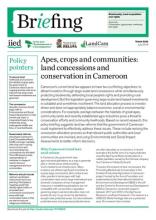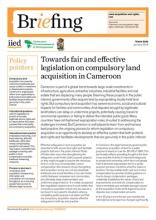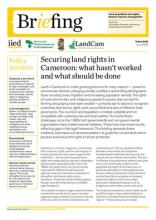/ library resources
Showing items 1 through 9 of 1847.Cameroon’s current land law appears to have two conflicting objectives: to attract investors through large-scale land concessions while simultaneously protecting biodiversity, defending local people’s rights and promoting rural development.
Cameroon is part of a global trend towards large-scale investments in infrastructure, agriculture, extractive industries, industrial facilities and real estate that are displacing many people.
Land in Cameroon is under growing pressure for many reasons — powerful commercial interests, changing climate conditions and shifting demographic flows including mass migration and increasing population density.
Au Mali, au début des années 1990, la décentralisation fut d’abord un acte politique permettant de proposer une solution viable au problème de la rébellion touarègue.
Variants of Indigenous forest management reflect distinct historical and political-economic contexts.
In this paper we study the interplay between residential location choice, sprawl and water quality.
The humid tropics are exposed to an unprecedented modernisation of agriculture involving rapid and mixed land-use changes with contrasted environmental impacts. Afforestation is often mentioned as an unambiguous solution for restoring ecosystem services and enhancing biodiversity.
Pagination
Land Library Search
Through our robust search engine, you can search for any item of the over 73,000 highly curated resources in the Land Library.
If you would like to find an overview of what is possible, feel free to peruse the Search Guide.





